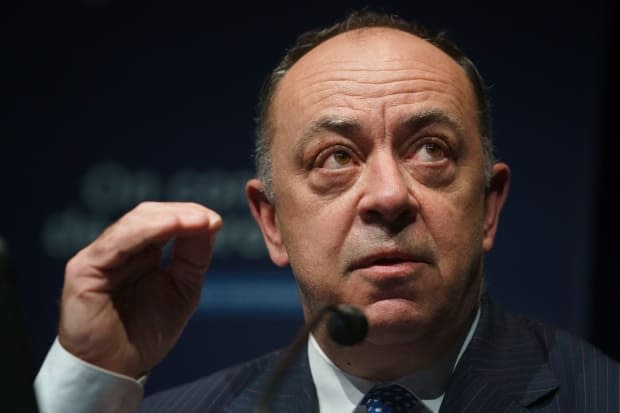Quebec tightens restrictions across province to prevent upsurge of COVID-19 variants

Premier François Legault says Quebec is tightening health measures in red zones like the Montreal region while allowing people as young as 55 to get vaccinated against COVID-19.
Starting Thursday, gyms will again close and houses of worship will be limited to 25 people, down from 250.
Starting next week, high school students in Secondary 3, 4 and 5 will attend class on alternating schedules once again. Extracurricular activities will also be stopped as some have proven to be sources of transmission, Legault said.
In red zones, under the province's colour-coded set of restrictions, pools and skating rinks will be allowed to stay open and individual sports will continue to be permitted, Legault said.
The curfew, currently set at 9:30 p.m. in the Montreal area, will not change, but the government may decide to move it back to 8 p.m. if the situation doesn't improve, Legault said.
WATCH | Quebec being 'proactive' with new measures, specialist says:
In Montreal, there has not been a big increase in hospitalizations "but we can think it will come in the next days and weeks," he said.
In Quebec's orange zones, elementary students will now have to wear a mask at school, Legault said. Houses of worship will be limited to 100 people, and there will be more sanitary measures in facilities such as gyms, sports centres and restaurants.
Public health officials have been told to immediately shut down places where there are outbreaks to investigate and isolate workers.
"The situation is under control. However, we are keeping a very close eye on it from one hour to the next," Legault said. "The month of April is going to be a critical, crucial month."
Vaccination campaign expands
Health Minister Christian Dubé announced COVID-19 vaccination appointments will be open to all Quebecers 60 and over by the end of the week, while those 55 and up will be able to book an appointment for an AstraZeneca-Oxford vaccine by Thursday.
Soon, people 55 and up will be able to walk into mass vaccination sites like Montreal's Olympic Stadium to get inoculated without an appointment, he said, as the aim is to distribute 355,000 AstraZeneca-Oxford doses as quickly as possible.

For now, vaccination has been reserved for people 60 and up in Montreal and in certain regions such as the Outaouais and Montérégie. Everywhere else, it has been 65 and up.
But in Montreal, excluding pharmacies, 52 per cent of the 37,000 time slots available this week had not found a taker by Sunday evening. Some 5,000 time slots were left vacant.
Dubé said that does not mean doses were left sleeping in freezers or in storage. They were instead sent to hard-hit regions to ensure the province continues to distribute doses at about the same rate it receives them.
Yo-yoing public health measures
Citing the improving COVID-19 situation in Quebec last month, the government allowed gyms to reopen provincewide on March 26 and authorized the resumption of some team sports.
In the weeks since, certain sectors of the province have seen sudden spikes in the number of cases and Quebec began locking down municipalities last week, starting with Quebec City, Lévis and Gatineau.
There are now special measures in certain sectors, while Capitale-Nationale, Chaudière-Appalaches, Outaouais and Lower Saint-Lawrence will all be red as of Monday.

The Laurentians, Lanaudière and Montérégie have long been included in Montreal's red zone.
The Eastern Townships, Mauricie et Centre-du-Québec and Saguenay–Lac-Saint-Jean are orange zones.
The Côte-Nord, Gaspésie–Îles-de-la-Madeleine and Nord-du-Québec are yellow, allowing people there to live life with limited public health measures.
Red and orange zone residents will not be allowed to travel to these yellow zones starting Thursday, and any other trips between regions are strongly discouraged, but there will be no roadblocks to stop people from travelling.
Legault defended his yo-yoing of public health measures, saying the the situation has been constantly changing. He said even public health experts have struggled to predict what is coming.
The premier said, even though it ended up being short-lived, loosening the restrictions for a few weeks was good for people's mental health as it allowed them to briefly return to activities they love.
Given what is happening in Ontario with a spike in cases and hospitalizations, Legault said Quebec needs to take preventive steps to avoid disaster.
"There is no one who can say with certainty where we will be in a week or two," Legault said, calling on residents to do their part by following public health measures and avoiding family gatherings.
He said the government is trying to make the best decisions it can with the information it has.
"We tried to give a little bit of freedom to keep that balance," said Legault. "Should we have closed everything in March and reopened in April? Well, there's no instruction manual."

